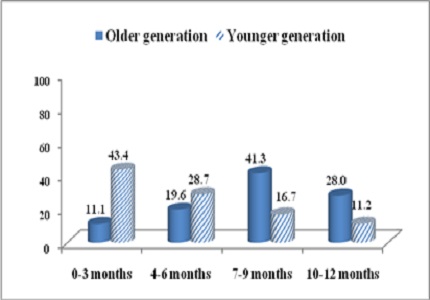Intergenerational patterns of contraception use during extended postpartum period among women in Haryana, India
Abstract
Background and Objectives: Present study is an attempt to examine the generational patterns of adoption of family planning during extended postpartum period before and after adjusting for individual, household and contextual factors. The study was further extended by analysing timing and type of contraceptive methods used by generations.
Methods : Primary survey data from Rohtak district of Haryana, India, was used, in which two successive generations were interviewed regarding family planning and contraception use.
Results: Findings demonstrated the different patterns of family planning use across the generations after adjusting for other potential covariates.The early initiation of use of family planning and use of modern methods during postpartum period was higher among younger women.
Conclusions: Though, by time and generations there has been a significant change in the extent and patterns of contraceptive adoption among postpartum women, still in few segments, younger generation women reported low use of family planning which calls for urgent policy attention.
Downloads
References
2. Sebastian MP, Khan ME, Kumari K, Idani R. Increasing postpartum contraception in rural India: Evaluation of a community based behaviour change communication intervention. International Perspectives on Sexual and Reproductive Health. 2012; 38(2): 68-77.Available from: http://paa2007.princeton.edu/papers/70351
3. Winikoff B. The effects of birth spacing on child and maternal health. Studies in Family Planning. 1983; 14(10): 231–245.
4. Rutstein S. Relationships Between Pregnancy Intervals and Prenatal Mortality: Proceedings of the 2nd Champions Meeting on Birth Spacing, Washington, DC: CATALYST Consortium. 2002; 15–22.
5. Conde-Agudelo A, Belizan JM. Maternal morbidity and mortality associated with inter-pregnancy interval: cross sectional study. British Medical Journal. 2000; 321(7271): 1255- 1259.
6. Ross AJ, Winfrey WL. Contraceptive Use, Intention to Use and Unmet Need During the Extended Postpartum Period. International Family Planning Perspectives. 2001; 27 (1): 20–7.
7. Sahoo H. Determinants of contraceptive use in Orissa: An analysis from National Family Health Survey III. Health and Population Perspectives and Issues. 2007; 30(3): 208-221.
8. Goel S, Bhatnagar I, Khan ME, Hazra A. Increasing Postpartum Contraception in Rural Uttar Pradesh. The Journal of Family Welfare. 2010; 56: 57-64. Available from:http://medind.nic.in/jah/t10/s1/jaht10s1p57.pdf
9. Mahmood SE, Srivastava A, Shrotiya VP, Shaifali I, Mishra P. Postpartum contraceptive use in rural Bareilly. Indian Journal of community health. 2011; 23(2): 56-57.Available from: http://www.iapsmupuk.org/journal/index.php/IJCH/article/view/52
10. Singh KK, Verma S, Tanti S. Contraceptive use among postpartum women in India, Asian Population Studies. 2013; DOI: 10.1080/17441730.2013. 827368.
11. Statacorp. Stata Statistical Software: Release 10. Statacorp LP, College Station, TX. 2007.
12. Watkins SC, Naomi R, David W. Orderly theories, disorderly women. In The Continuing Demographic Transition. (Eds.) G.W. Jones, R.M. Douglas, J.C. Caldwell, and R.M. D’Souza. New York: Oxford University Press. 1997.
13.Omondi-Odhiambo. Men’s participation in family planning decisions in Kenya. Population Studies. 1997; 51(1): 29–40.
14. Stephenson R, Koenig MA, Acharya R, Roy TK. Domestic violence, contraceptive use and unwanted pregnancy in rural India. Studies in Family Planning. 2008; 39(3): 177–186. [PubMed]
15. Bender DE, McCann MF. The influence of maternal intergenerational education on health behaviors of women in peri-urban Bolivia. Social Science & Medicine.2000; 50(9): 1189–1196. DOI: 10.1016/S0277-9536(99)00369-X.
16. Mumtaz Z, Salway S. ‘I never go anywhere’: extricating the links between women’s mobility and uptake of reproductive health services in Pakistan. Social Science & Medicine. 2005; 60(8): 1751–1765. DOI: 10.1016/j.socscimed.2004.08.019.

Copyright (c) 2017 Author (s). Published by Siddharth Health Research and Social Welfare Society

This work is licensed under a Creative Commons Attribution 4.0 International License.


 OAI - Open Archives Initiative
OAI - Open Archives Initiative


